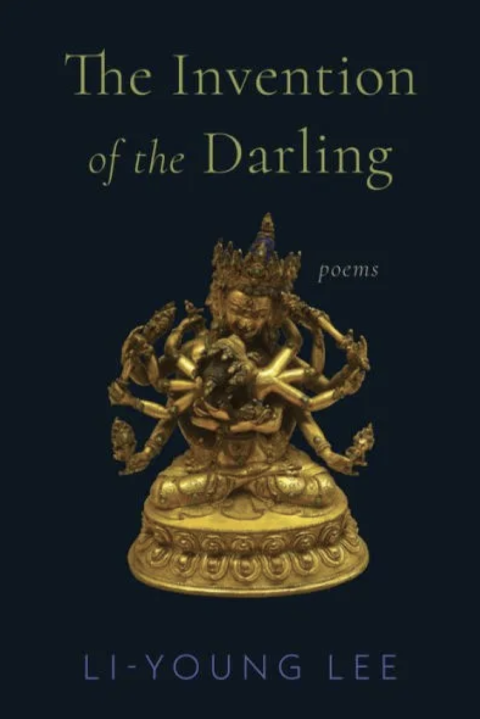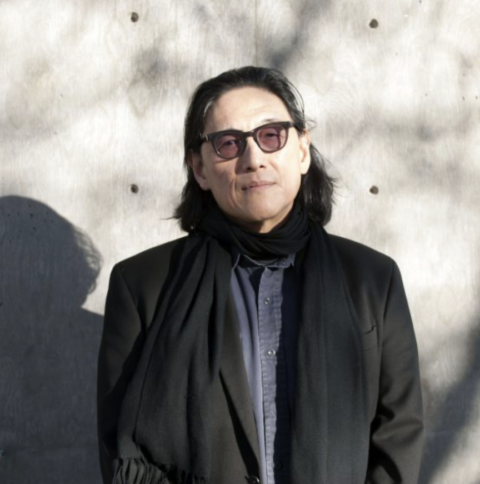In conversation with Ashley Beene in the Los Angeles Review of Books, Li Young Lee notes that “the Chinese say, ‘[writing poems is the practice of Yin] beckoning to Yang,'” and lamenting, “[w]e live in a culture in which yielding is not a virtue.” Lee submits that we live in a culture congested with ego. In The Invention of the Darling, Lee’s fifth poetry collection since his enchanting 1985 debut Rose, speakers take turns yielding to something larger than themselves. They eschew contemporary obsessions with claiming veracity and underscore how the essential nature of life is found in its profound immeasurability. The collection enacts a return – a volta – from the isolationist and consumptive tendencies of the self and towards the omnific, agape love of the divine.
In “The Herald’s Wand,” a poem that discloses the myth of a deity who existed when there was “… none beside her, and nothing other,” the world is created from scratch:
… the world was born
At the end of the night, when the serpent cried out,
“O Sister,”
And the serpent’s sister came forth.
[…]
And where she received her sister,
the serpent called West.
 The deity, who was a woman before she became a serpent, “created the world” through her own cries and groans. The jewel of her creation is the family: a woman affectionately called sister and a man affectionately called brother. The deity imbues the former with creative power and the latter with knowledge of the world’s mysteries. The deity invents the sister and brother – not out of creative curiosity or duty – but out of a longing to share the burgeoning world with a beloved, a darling. Here, Lee identifies a tether between the lover and the beloved, like a string between two people, hanging loose when they are near one another and extending tautly when they depart in separate directions. This tether is central to the collection, so existent that each relationship explored in the book (son-father, son-mother, wife-husband etc) feels like a descendant of this original triad of love, “The lover and the beloved entwined / one tangle with God.”
The deity, who was a woman before she became a serpent, “created the world” through her own cries and groans. The jewel of her creation is the family: a woman affectionately called sister and a man affectionately called brother. The deity imbues the former with creative power and the latter with knowledge of the world’s mysteries. The deity invents the sister and brother – not out of creative curiosity or duty – but out of a longing to share the burgeoning world with a beloved, a darling. Here, Lee identifies a tether between the lover and the beloved, like a string between two people, hanging loose when they are near one another and extending tautly when they depart in separate directions. This tether is central to the collection, so existent that each relationship explored in the book (son-father, son-mother, wife-husband etc) feels like a descendant of this original triad of love, “The lover and the beloved entwined / one tangle with God.”
As Lee points out in the epilogue, Darling is “For [Those] Who Wrestle with God,” and the aforementioned triad (of serpent, sister and brother) is where the wrestling begins. The origin of the wrestling, Lee decides, is in self-interest; instead of yielding to their ccreator, the created slowly yield to themselves – yearn for themselves: “[o]ne morning the serpent’s sister, entranced / by the sound of wind in the trees, began to sing to herself. / Her lone voice, uncoupled,” and “[o]ne night the serpent’s sister, wondering / about her origin, told herself a story / in her own voice.” This separateness and desire to be known to oneself alone, Lee’s speaker admits, is how “death entered, and with death / the mysteries of beginnings and endings.” Shortly afterwards, the triad breaks, as the brother and sister decide to flee for a place “to hide.” Lee uses this myth as a backdrop to the lamentations. The place they chose to hide is “here, where all things are divisible.” The speaker of the poem divulges that they are an offspring of sister and brother. He is filled with the conflicting desires: his mother’s whose “every story […] is about fleeing, and his father’s whose dreams give him up (and tug at his child):
Every dream
my father dreams
is a dream of the indivisible
I dream upon my father’s dreams
Lee establishes a dichotomy — the indivisible stands for those things existing in mystery, those things near to the divine, while the divisible stands for those things that are finite, near and passing away. The divisible world is the world his speakers live in; they are in medias res. Lee’s poems flow in succession; his speakers’ cries and groans are heard throughout the collection, yearning to reenact what the deity managed at the beginning of the world, all those eons ago. In this way, the offices of the creator and the poet intersect – both work to erect fully realized, breathable worlds through words.
Distinctively, Darling has no dividers or sections. It does have a form, however, and the form is return … is echo. Images echo from poem to poem, “falling leaves,” “wings,” “eyes.” Characters echo: the mother appears and leaves, only to come back again; the father materializes, exits, and reenters. Again and again, speakers list, speakers offer questions, speakers forget. One can feel Lee moving from stanza to stanza like a shadow shifting from one room to another.
 Love is the framework with which Lee spins and expands the collections’ arguments, echoing sentiments he shared with students and faculty at Hopkins School in New Haven in 2017, “[love is] the highest thing a poem can embody or communicate.” Love unrequited, love requited. Eros, storge, phileo. Lee mixes figurative language and literal love dynamics to conflate the divine with the very-mortal. For all the weightiness of the collection’s emotional values, Lee is having fun. Like a tennis player, he serves swishfully and waits on tips of his toes to return the ball in an unexpected and thrilling direction.
Love is the framework with which Lee spins and expands the collections’ arguments, echoing sentiments he shared with students and faculty at Hopkins School in New Haven in 2017, “[love is] the highest thing a poem can embody or communicate.” Love unrequited, love requited. Eros, storge, phileo. Lee mixes figurative language and literal love dynamics to conflate the divine with the very-mortal. For all the weightiness of the collection’s emotional values, Lee is having fun. Like a tennis player, he serves swishfully and waits on tips of his toes to return the ball in an unexpected and thrilling direction.
In the final poem of this collection, there is yet another echo. Two men love the same woman. This woman is described as one who “singing, [makes] a new world,” who causes “whatever enters her singing [to live] again …” She, we register, is “ making / and re-making the world in the image of love.” There is no clear mention of “The Herald’s Wand,” but the tether is there. The love described in the poem is creative and omnipotent – the dynamic of lovers is a triad. The form confirms the content. The speaker stands, like the others in the collection – aware of his distance, “Friend, regarding this woman we both love, / I have bad news./ she’s not coming,” and a follow-up, “but maybe you already knew that.” The separation still exists. Lee does not take the reader over the chasm. He calls it to attention because this is a work about the present. It appears that the other person, the friend in love with the same woman – is you, is me:
You and I are in love with the same woman.
And I don’t know if the grief I hear
in your music is yours or hers,
the depiction of the lover separated from the beloved,
or the beloved’s disappointment at having given
herself absolutely to her lover,
yet remaining unknown.
Lee’s Darling enacts an ouroboros through which the modern circles back to the ancient, the material circles back to the spiritual and the divisible circles back to the indivisible. Darling beckons us to see the world as divinely tailored. So much so, that when we see our loved ones we see the divine. The final lines read, “I thought I’d lost my mother. / It was I who was lost. / Here she is, a pure vibration / across two bridges.” We readers may imagine that the speaker is referring to their beloved mother, but also can’t help but hear the echo of the mother who opens the collection crying out for her beloved to appear. The modern returns to the ancient. We end where we began.
[Published by W. W. Norton on May 14, 2024, 144 pages, $$26.99 hardcover]